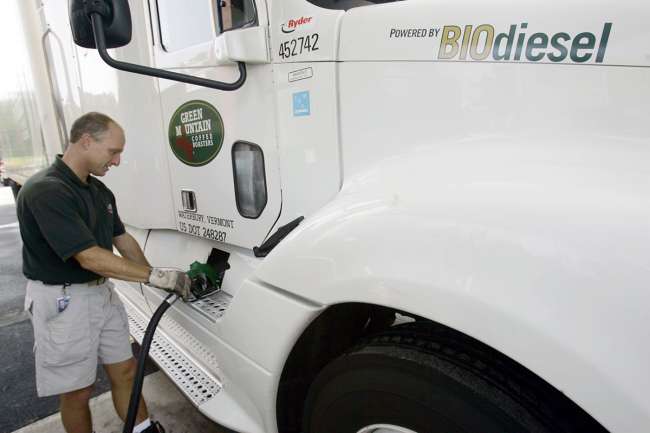Senior Reporter
EPA Rebuffs Biodiesel Makers, Won’t Increase Minimum Production Level for 2019

Despite pressure from biodiesel producers to require greater minimum production levels of biomass-based diesel, the U.S. Environmental Protection Agency has stuck to its proposed plan to maintain the 2018 level of 2.1 billion gallons for 2019.
In a Nov. 30 announcement, the agency set the 2019 biomass-based diesel level at 2.1 billion gallons — slightly higher than the 2017 level of 2.0 billion gallons. (The biomass-based diesel requirement, unlike other biofuel requirements, is set a year in advance. The 2018 level was set last year.)
In addition, the agency’s final renewable fuel standard will slightly decline in 2018 for cellulosic biofuels, to 288 million gallons from 311 million gallons in 2017.
The agency said it was slightly increasing all renewable fuels to 19.29 billion gallons from last year’s 19.28 billion gallons and advanced biofuels to 4.29 billion gallons from last year’s 4.28 billion gallons.
The term renewable fuel typically refers to ethanol derived from corn starch, while all biofuels are made from plant material. Biomass-based diesel is blended primarily with soybean oil, while cellulosic sources of biofuels include leaves, stems and other fibrouss parts of a plant, according to EPA.

TT File Photo
“Maintaining the renewable fuel standard at current levels ensures stability in the marketplace and follows through with my commitment to meet the statutory deadlines and lead the agency by upholding the rule of law,” EPA Administrator Scott Pruitt said in a statement.
The RFS program is a national policy that requires a certain volume of renewable fuel to replace or reduce the quantity of petroleum-based transportation fuel, heating oil or jet fuel. The standard, intended to move the United States toward greater energy independence and security and increasing the production of clean renewable fuels, has been in effect since 2006.
The program was created under the Energy Policy Act of 2005 and expanded by the Energy Independence and Security Act of 2007. EPA implements the program in consultation with U.S. Department of Agriculture and the Department of Energy.
“I don’t think anyone’s pleased with the levels that have been set,” said Glen Kedzie, energy and environmental counsel with American Trucking Associations. “The corn producers don’t like it because they think it should be higher. The biodiesel folks don’t like it because they think that their number should be higher, and the oil industry thinks it’s too high.”
Indeed, many of the more than 235,000 written comments submitted on the EPA’s proposal earlier this year were opposed to the RFS levels presented.
At an EPA hearing in August, supporters of biomass-based and advanced biodiesel wanted higher production requirements, oil producers asked for the agency to reduce or even eliminate ethanol blends in gasoline, and representatives from such conservative-leaning groups as Campaign for Liberty and Frontiers of Freedom simply thought the idea of forcing Americans to use renewable fuels was misguided.
Doug Whitehead, chief operating officer of the National #Biodiesel Board @Biodiesel_Media, “This is a two to four year signal that this @EPA is not interested in our growth.” #biofuels #biofueladditives #biodieseladditives https://t.co/5BRRUmXjJX pic.twitter.com/LSSZ7gk3MW — AG Chemi Group (@AGchemigroup) December 5, 2017
At the hearing, biodiesel producers voiced concerns that the Trump administration is beginning to put the brakes on sustained attempts by Congress to steadily increase the supply of renewable fuels for both environmental and energy security reasons.
But EPA has maintained that it has the authority to reduce renewable fuels standard program volume targets and said it planned to do so in response to such “circumstances” as market conditions and projected volumes of available fuel.
The American Soybean Association urged EPA to increase the volumes for biomass-based diesel to 2.5 billion gallons for 2019, an increase of 400 million gallons over the levels in the EPA proposal, yet still below the amount actually utilized in the United States in 2016.
Doug Whitehead, chief operating officer of the National Biodiesel Board, said in a statement after the new levels were announced that “EPA Administrator Pruitt has disappointed the biodiesel industry for failing to respond to our repeated calls for growth.
“These flat volumes will harm Americans across several job-creating sectors — be they farmers, grease collectors, crushers, biodiesel producers or truckers — as well as consumers. We’ll continue to work with the administration to right this wrong for future volumes.”




